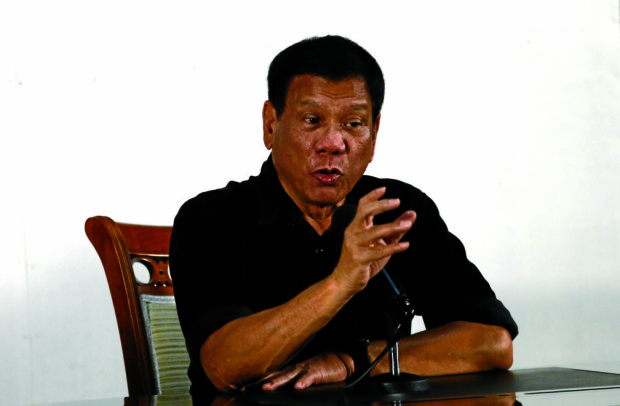Using only state-owned media undermines free press, experts say
THAT President-elect Rodrigo Duterte has chosen to suspend his press conferences and instead issue statements via the state-owned television, even prior to taking his oath of office on June 30, has raised alarm bells among communications experts who said such policy undermines a free press.
A person in authority—in this case the incoming President—can always manipulate information coming from state media, veteran journalist Vergel Santos warned.
“Duterte has been antagonizing the media to provoke a boycott and when that didn’t happen, he decided to go to the government station which he can always manipulate,” Santos, chairman the Center for Media Freedom and Responsibility (CMFR) Board of Trustees, told the Inquirer by phone on Saturday.
The control of the flow of information was the same strategy used by the dictator Ferdinand Marcos, which kept people blind to the transactional politics and the corruption that took place in government.
“Marcos decided to do more by imposing martial law. All Duterte wants to happen now is to avoid media because he cannot handle the media… He has been unraveling,” Santos said.
Unlike the more independent private media entities, state-controlled media “have always been suspect” precisely because they take orders from the authorities, Santos said.
“While fairness is not always a guarantee in private media entities, what they give is a plurality of viewpoints,” Santos said.
He added: “By the very nature of democracy itself, the private media are thinking in terms of competition and thus naturally would strive to have credibility” to gain more audience.
Santos believed that Duterte “will lose” in his attempt to issue statements only through PTV4.
The other media that Duterte wants to isolate would be forced to get stories from second hand sources, such as those within the incoming President’s inner circle, Santos explained.
Santos recalled that then President Gloria Macapagal-Arroyo had also imposed a similar policy, announcing that she would only take questions from journalists pertaining to the economy.
“But the media that time still did a pretty good job of putting together a good picture of the political situation by interviewing other sources,” Santos said.
Freedom of information
In a separate interview, Communications professor Edson Tandoc, Jr. pointed out that Duterte had announced two days after his election that he would implement a freedom of information (FOI) policy by issuing an executive order.
Congress failed to pass the FOI bill, a campaign promise of President Aquino in 2010.
Over the weekend, Duterte’s communications team reiterated that the President-elect would push for the FOI, even after his tirades against media and his decision to talk only to the state-owned television.
“It is important to examine this in relation to the incoming administration’s earlier promise of prioritizing freedom of information and eliminating corruption,” said Tandoc, who teaches at the Wee Kim Wee School of Communication and Information at Nanyang Technological University in Singapore.
Tandoc’s recent research showed that “countries with strong freedom of information laws also enjoy very low levels of corruption.”
“So clearly, there is a link here. Of course, it is Mr. Duterte’s right to choose whether or not to grant interviews, but restricting media access to him and coursing all statements through the state-controlled network do not fit into the framework of granting citizens, represented by journalists, free access to information,” Tandoc, a former Inquirer reporter, explained.
Communications Secretary Herminio Coloma, Jr. said Saturday that the mission of the People’s Television “is to bring true, relevant, and correct information to the citizenry.”
Coloma heads the Presidential Communications Operations Office (PCOO), which oversees Radio-TV Malacañang (RTVM) and state-run media PTV4 and Radyo ng Bayan.
Coloma, on state-run Radyo ng Bayan, explained that even if Duterte has yet to take his oath as the next President, his use of government resources normally utilized by the incumbent President, is part of the “transition process.”
Coloma likened it to the use of Duterte of the Malacañang of the south, the presidential guest house in Davao City built during the time of President Gloria Macapagal-Arroyo. The building is in the Department of Public Works and Highways (DPWH) compound.
“We don’t see any problem with that and it is within the bounds of the law,” Coloma said of Duterte’s use of the presidential facilities.
Duterte’s camp announced on Friday that the President-elect would no longer hold press conferences or grant interviews. Instead, he would only speak to PTV 4 and course his statements through the government channel.
The decision was arrived at “so that there would be no more errors,” according to Duterte’s chief aide, Christopher Go.
Duterte, 71, came under fire for defending the murders of journalists, saying those who were killed were corrupt, and when he catcalled a female television reporter at a media briefing.
But as expected, the incoming President was unapologetic. On Thursday, he delivered yet again another rambling press conference where he dared the media to boycott his press conference.
He also vented his ire on the United Nations in response to a question about foreign media groups that were critical of him.
However, the journalists’ criticisms had not been linked to any UN protocols.
“Fuck you UN, you can’t even solve the Middle East carnage… couldn’t even lift a finger in Africa… shut up all of you,” Duterte, a long time Davao City mayor known for his profanities, said at the Thursday press conference.

